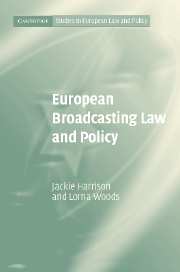Book contents
- Frontmatter
- Contents
- Series Editors' Preface
- Preface
- Case list
- PART I
- PART II
- 6 Access
- 7 Media ownership: impact on access and content
- 8 Jurisdiction, forum shopping and the ‘race to the bottom’
- 9 Advertising placement and frequency: balancing the needs of viewers and commercial interests
- 10 Negative content regulation
- 11 Positive content regulation: quotas
- 12 Privatisation of sport and listed events
- 13 State aid: constraints on public service broadcasting
- PART III
- Appendix
- Bibliography
- Index
8 - Jurisdiction, forum shopping and the ‘race to the bottom’
Published online by Cambridge University Press: 29 July 2009
- Frontmatter
- Contents
- Series Editors' Preface
- Preface
- Case list
- PART I
- PART II
- 6 Access
- 7 Media ownership: impact on access and content
- 8 Jurisdiction, forum shopping and the ‘race to the bottom’
- 9 Advertising placement and frequency: balancing the needs of viewers and commercial interests
- 10 Negative content regulation
- 11 Positive content regulation: quotas
- 12 Privatisation of sport and listed events
- 13 State aid: constraints on public service broadcasting
- PART III
- Appendix
- Bibliography
- Index
Summary
Introduction
The underlying principle of the Television without Frontiers Directive (TWFD) is that of a ‘one-stop shop’ that is, where television services within the Union will be regulated only once. Jurisdiction is significant as it determines who is subject to regulation and by whom, thereby determining the level of regulation to which particular content services are subject. Given the inherently cross-border nature of satellite broadcasting, broadcasts from one member state are capable of reception in another. Content subject to the regulatory regime of one member state becomes available to viewers in another. This may be problematic if viewers are only used to the protection afforded by the regulatory framework in their own member state and do not know how to make judgments about all the content made available to them. The central question which arises in the context of the jurisdiction clause is whether individual member states should be permitted to continue to regulate all broadcasts capable of reception within their territory, or whether internal market considerations should take priority.
Convergence has raised further problems in that the boundaries between broadcasting and other forms of communication have blurred and, although there has been some degree of convergence in transmission regulation (chapter 6), there has not yet been convergence of content regulation between different types of service. Jurisdiction in relation to type of service seems to be becoming as problematic as the determination of which member state has the power to regulate a service in a particular case.
- Type
- Chapter
- Information
- European Broadcasting Law and Policy , pp. 173 - 193Publisher: Cambridge University PressPrint publication year: 2007



